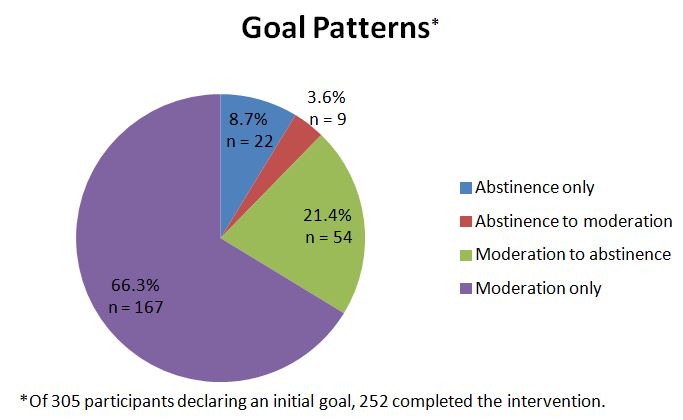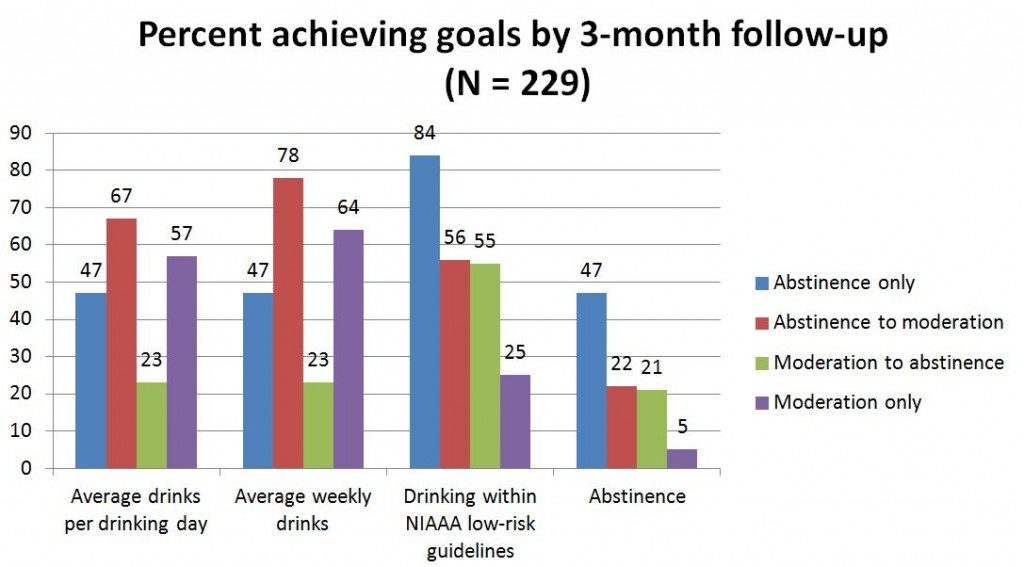Abstinence or Moderation? Drinking Goals in a Web-based Intervention for Veterans
Selecting a specific goal is an important part of any behavior change. While abstinence goals have been the convention in alcohol addiction treatment, moderation may be a feasible goal for many individuals with problematic drinking; those who are most successful with moderation tend to be younger and report fewer and short duration of drinking-related problems and less heavy drinking episodes.
Web-based interventions are a low cost, convenient way to reach a wide range of people who have computer access.
VetChange is an 8-module, 8-week Web-based cognitive-behavioral intervention for U.S. Veterans from Operation Enduring Freedom / Operation Iraqi Freedom who experienced post-deployment problem drinking. Eligible participants (N = 600) were randomized to receive the intervention immediately (n = 404) or in a second wave 8-weeks post-randomization (n = 196).
This intervention focused on treating people who engaged in harmful drinking but were not likely to have severe alcohol use disorder (ie., Alcohol Use Disorders Identification Test [AUDIT] scores between 8 and 25 for men and 5 and 25 for women) due to uncertainty of the benefit of a Web-based intervention for people with more severe drinking.
In a secondary analysis of the initial randomized controlled trial, Enggasser and colleagues used the subset of participants (n = 305) who completed module 3 which asked them to declare an initial drinking goal (i.e., abstinence or moderation), to determine if goal selection was related to drinking outcomes at the end of treatment and at 3-months follow-up. Participants were 87% male, 79% Caucasian, and 32 years old on average. Modules 4 though 7 asked participants to restate their goal, which allowed them to change their goal, resulting in four goal-pattern groups described below. Goal patterns reflected change from initial to final choice.

The two groups with an initial goal of abstinence were older than those with an initial goal of moderation.
Alcohol use was measured using average drinks per drinking day, average weekly drinks, and average percent heavy drinking days. Alcohol use significantly decreased for abstinence only, moderation to abstinence, and moderation only groups from baseline to post-intervention and 3-month follow-up. While the abstinence to moderation group did not have significant reductions at the post-intervention assessment, the overall trend was significant for each outcome.
The improvements observed post-intervention were significantly less among participants reporting more severe drinking at baseline; this effect was similar across all four groups. While alcohol outcomes improved overall for each group, those with a goal of abstinence only were more likely than those with a moderation only goal to be drinking within the NIAAA low-risk drinking guidelines (including abstinence) by 3-month follow-up (84% vs. 25%, respectively).

IN CONTEXT
This study presented two ideas that are important for the future of recovery research:
- the creation of Web-based interventions is an emerging method that offers a potentially cost-efficient model with greater reach
- portability relative to traditional treatment
The Internet is a valuable resource for the field of recovery, and it is crucial that interventions are designed to stay relevant given the shift towards an Internet-based society.
This particular intervention recruited participants through targeted Facebook advertisements, showing how social media has the ability to reach people that may otherwise miss important health information and interventions.
The other important topic from this study was the ability for patients to select their own drinking goals. Studies have shown that abstinence is associated with greater quality of life (ie., overall health, relationships, employment) post-treatment for individuals recovering from alcohol use disorder.
Since the follow-up period in this study was only 3 months post-intervention, differences between groups at future time points are unknown. A study with 3 years of follow-up showed that among patients in remission from alcohol use disorder (including abstinent, low risk, and risky drinkers), abstinent individuals were less likely to relapse. However, due to the Web-based nature of this intervention, VetChange requires a degree of self-management from participants in terms of completing the weekly modules and homework assignments.
Goal selection may be an important component of VetChange’s success since allowing participants to set their own goal has been associated with self-efficacy and commitment for achieving the goal in prior studies. Abstinence may be a better recommendation based on current literature, certainly for those with more severe alcohol involvement and related problems, but more research on Web-based interventions is needed to determine if these results generalize to this type of intervention.
Web-based interventions have the potential to reach many more people in the privacy of their own homes and thus could have a widespread public health impact even if the effect size was small. While Web-based interventions will continue to emerge, it is important that they are properly evaluated and modified to best serve the populations they aim to reach.
- LIMITATIONS
-
- It is unclear if this intervention is appropriate for patients reporting more severe drinking. This study found less improvement in alcohol use outcomes for those with more severe drinking at baseline. Certain substance use disorders and certain levels of severity may be better suited for traditional methods monitored and managed by clinical professionals.
BOTTOM LINE
- For individuals & families seeking recovery: Web-based approaches are likely to help reduce drinking irrespective of whether they want to moderate or abstain, and are a step in the right direction.
- For scientists: Since most research on abstinence vs. moderation goals have focused on people with more severe alcohol use, it is important to study problem drinkers as seen in the current study. More research is needed to address problem drinking in the general population given the health, social, and economic, burden attributable to this large pool of drinkers.
- For policy makers: If deemed effective, Web-based interventions are a low-cost method of providing treatment to a wide array of patients. Further research is needed before widespread implementation, but this may represent a cost-efficient mode of treatment in the future. There is no doubt that Veterans are in need of greater support for substance use and mental health services; more funds should be allocated towards treatment of substance use disorders in this population in particular.
- For treatment professionals and treatment systems: Veterans have unique needs compared to other patients. Services beyond a Web-based intervention may be necessary for those with severe problem drinking or comorbid mental health conditions.
CITATIONS
Enggasser, J. L., Hermos, J. A., Rubin, A., Lachowicz, M., Rybin, D., Brief, D. J., … & Keane, T. M. (2015). Drinking goal choice and outcomes in a Web-based alcohol intervention: Results from VetChange. Addictive Behaviors, 42, 63-68.

